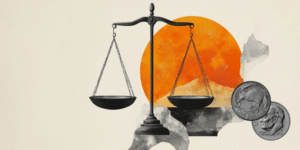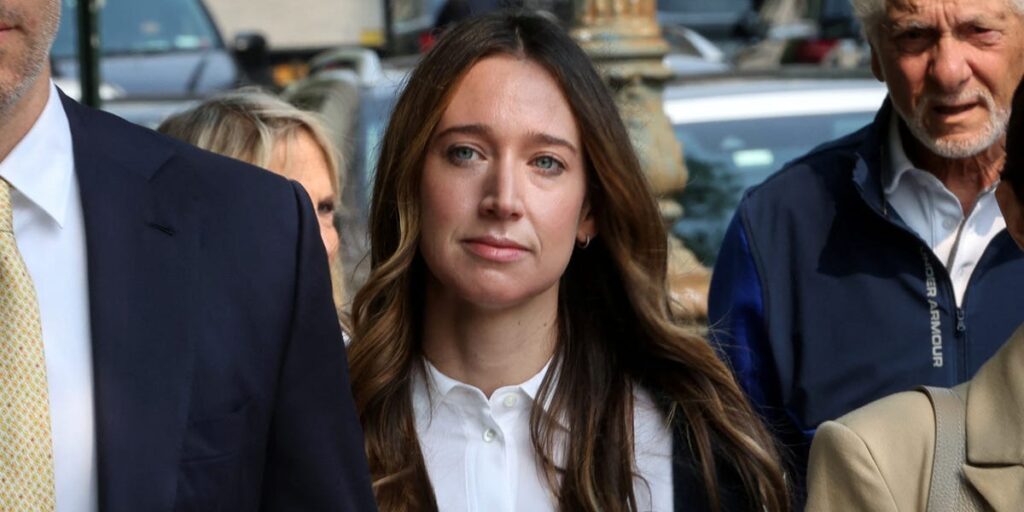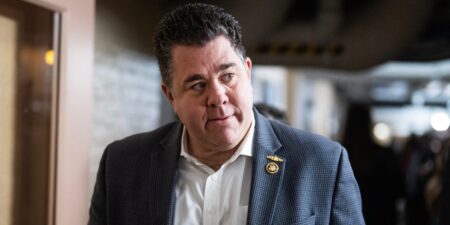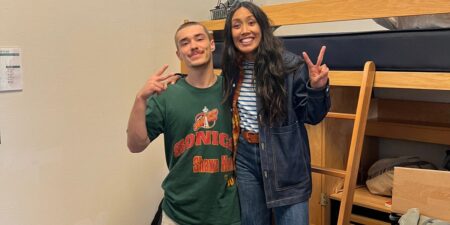A federal jury in Manhattan has convicted Frank founder Charlie Javice of four counts of defrauding JPMorgan Chase.
It took jurors 8 hours of deliberations over two days to reach Friday’s verdict: the finding that during six weeks of testimony, prosecutors proved Javice used fake data to trick the world’s largest bank into buying her startup for $175 million.
The maximum sentence for the charges is 30 years in prison. Sentencing for Javice was set for 11 a.m. July 26.
Javice showed no expression as the verdict was read. Several family members sitting behind Javice held each other and audibly sobbed.
Juror number four, a woman who sat in the front row of the jury box, was also visibly moved.
The juror had frequently smiled back at Javice while walking past her as the jury entered and left the courtroom. On Friday, as the jury was individually polled, she held her hand to her mouth, appearing stricken by the decision and on the brink of tears.
The five-woman, seven-man jury also convicted Javice’s top lieutenant-turned-codefendant, Olivier Amar. He was found guilty of the same fraud counts as Javice.
Those charges were conspiracy to commit securities and wire fraud, plus bank, wire, and securities fraud.
“You came to a verdict that was reasonable,” US District Court Judge Alvin Hellerstein said in thanking the jury for their service.
As the audience rose from their seats to acknowledge the jury filing out of the courtroom for the last time, three Javice family members remained seated.
The verdict is the latest chapter in a spectacular fall from grace for the once-promising microfinance entrepreneur.
Javice was 27 years old in the summer of 2021, when JPMorgan executives agreed to acquire her website.
She was at the height of her success. She had been featured in Forbes’ 30 under 30 in 2019, and had attracted tens of millions of dollars in private equity funding.
Aleph’s Michael Eisenberg and Apollo’s Marc Rowan were early investors and board members. During negotiations, she met one-on-one for 30 minutes with CEO Jamie Dimon.
“They saw something in Charlie, a young female CEO breaking the glass ceiling,” her lead attorney, Baez told jurors in opening statements.
The bank’s main goal in acquiring Frank, the defense lawyer argued, was to hire this rising fintech star as managing director in charge of student solutions — and to keep her and the website out of the hands of the competition.
“That’s what JPMorgan negotiated for,” Baez told jurors. “And that’s what they got.”
Prosecutors countered that the only real draw was Javice’s data.
Frank gave students a simplified platform for filling out their FAFSA forms — the Free Application for Federal Student Aid — making it a treasure trove of student data and of great interest to banks.
Visitors would create an account and begin entering their financial and identifying information. The Frank site boasted that it used these inputs to generate a completed FAFSA in seven minutes, far more quickly than the average 13 hours the forms otherwise took to complete.
According to trial testimony, by the time the Frank-JPMorgan merger closed after months of negotiations, just under 300,000 visitors had signed up for a Frank account and, as part of beginning a FAFSA, had shared their first name, last name, email address, and phone number.
Prosecutors said Javice fraudulently enticed JPMorgan to pay $175 million for the website by wildly inflating that 300,000 figure.
The pair consistently assured JPMorgan “that Frank had over 4 million users and that a user was someone who’d started an account by providing their first name, last name, phone number, and email,” a federal prosecutor told jurors in closing arguments.
“Charlie Javice and Olivier Amar sold Frank for $175 million worth of lies,” the prosecutor, Nicholas Chiuchiolo told them on Wednesday.
“Frank’s 4 million customers — they were made up,” Chiuchilo said. “Literally made up by a computer program. They did not exist. And through their lies Ms. Javice and Mr. Amar became multimillionaires.”
The bank purchased Frank in order to market financial products — Chase checking accounts, credit cards, auto loans, and the like — directly to these 4 million students.
Lawyers for Javice and Amar countered that they’d made it clear to the bank that when they referred to their 4 million users, they meant these were merely the number of website visitors.
They also argued that the distinction didn’t actually matter. The bank never cared how many visitors or student emails Frank had, the defense argued. It cared so little, in fact, that during months of negotiations — as all sides in the case agree — its executives never bothered to verify if the 4 million users Frank was claiming were real.
Multiple government witnesses, including then-Chase CFO Sarah Youngwood — now the CFO of Nasdaq — told jurors a different story.
They testified that what JPMorgan really wanted from the purchase were those millions of rows of student contact information, which the bank could use to pitch Chase accounts to young people at the start of their financial journeys.
Leslie Wims Morris was the JPMorgan corporate development head who led the bank’s Frank acquisition team. She told jurors that the bank relied on trust, not verification.
She also told jurors there’s no way JPMorgan would have even looked at Frank if the bank knew that Javice only had the names and personal identifying information for fewer than 300,000 students.
Baez mocked Wims Morris in Wednesday’s closings, noting that since the deal with Frank went south, she’s now CEO of Chase Auto.
“I think her biggest client is Frank’s Auto Lot,” the Javice’s lawyer joked to jurors.
This is a breaking story. Please check back for developments.
Read the full article here
















